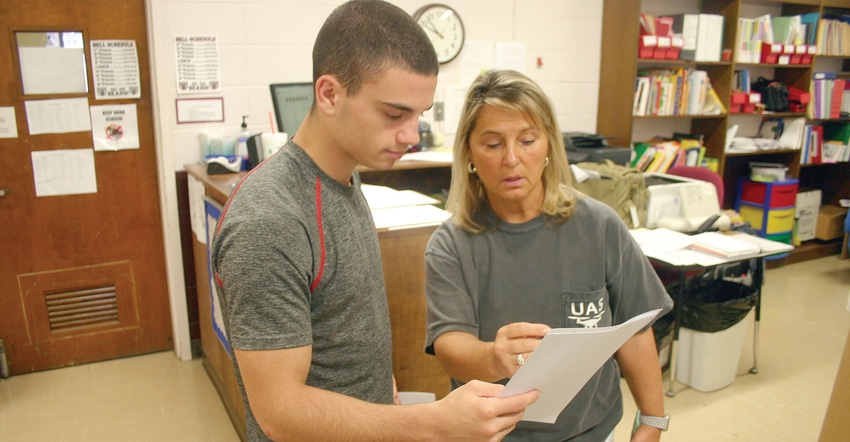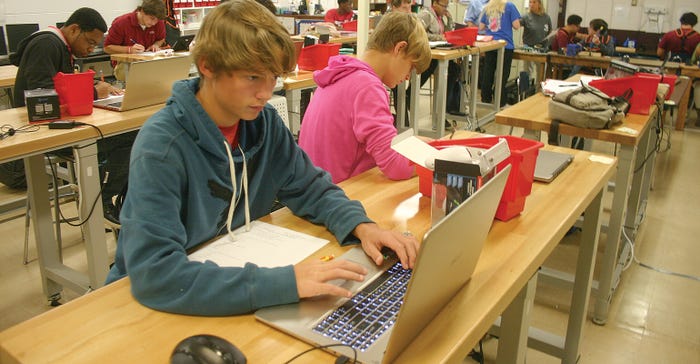
About a 20 minute drive west of the Helena bridge, 350-some students attend east Arkansas’ Barton High School. Eighteen of them are in a program focusing on drones.
Barton School District instructors believe the program could be a game-changer for students and, more broadly, the larger community. That’s why they want their charges to know the increasingly ubiquitous technology inside and out. The idea is for the tech students to learn from the ground up, to acquire skills allowing a project to move from step to step to completion. And then, when the student is proudly standing next to some shiny new drone built from scratch, the teachers want them to be able to strip it all down and start over.
As all good teachers do, the Barton crew strives to impart this ability because they want these students to be successful in later life. But as much largesse as that desire carries, there is another ingredient in the recipe: survival.
The sad fact is the Delta is being drained of youth. As good-paying jobs continue to elude the region, Delta communities are slowly shriveling. Jobs are in the city and so that’s where the kids – and let’s be honest, the future tax base and economic health of the community -- go. Several decades of labor force shrinkage has proven those lost jobs aren’t coming back on their own.
Tired of waiting, Barton High School is taking another approach.

Nic Thomas, left, and Brandon Newsom working things out in Barton High School’s first-year drone program.
“I’m telling you, it will only take one student to come out of this to prove the benefits,” says Debbie Young, a clever instructor and cheerleader for the class. “We just need that one success to show other students, their parents, the whole community, that this is a real educational experience that benefits everyone. Once that happens, no one will let these programs go away.”
Such enthusiasm is buoying. Still, it’s tough, admits Young, when trying to teach something complicated in 45-minute chunks. Today’s lesson is on soldering.
“Some folks don’t believe it but our kids really are learning to build drones from scratch,” says Superintendent David Tollett, a young man who envisions great success for a handful of programs being revitalized at the school. “They’re learning the guts of this. They’re taking kits and they’ll solder, do electrical work, set up and operate cameras.” Only when that is done and they’re ready will the students “actually do the flying and imaging.��”
This is the first year of the program -- done through an Arkansas Career Education grant that four schools were chosen for -- and the students will mostly concentrate on the building and operation of the machines. The program’s second year will see the students operating the drones and, if they want, sitting for the test to become licensed operators.

Among those in the Barton drone program: (from left) Hunter Schwantz, K’audreeya Fletcher and Darrian Thomas.
Young says growers in this area of east Arkansas are well aware of what the students could be on the verge of. “They know this technology is here and can help in their operations – probably in ways they haven’t even considered yet. When it comes down to it, farmers also know there aren’t a lot of local resources to tap. It isn’t like calling someone for help fixing a tractor. The nearest repair stations for these drones are in Dallas or St. Louis.”
They insist enterprising, focused high school students will fill those gaps. Young saw the benefits of a drone program and, in order to teach it, studied up to become, last summer, the first certified commercial drone pilot among east Arkansas teachers. She dreams big. “This isn’t pie in the sky. I know what these kids are capable of. They could make a successful business out of this very fast.”
Instructor J Southard agrees. “The job potential for those who complete this class will be incredible. Once a kid gets a commercial license, they can begin working” during their upperclassman years. “We’ll continue to expand this program. Right now, we’re providing a foundation for what comes later. They’re learning aerodynamics, about flight, about FAA regulations. They’re digging into the necessary computer programs. Next year, we’ll get involved with things like thermal cameras and fly over row-crops to detect moisture levels.”
One interesting twist the teachers weren’t expecting is the attention students pay to FAA regulations. “We have students come in and tell us some rule has been changed,” says Southard.
And staying ahead of the knowledge students are acquiring outside the classroom has also been a challenge. “They’re intrinsically so much better at things like handling remote controls – that’s generational, I think,” says Young. “It may be hard for my generation to figure this out but they’re not intimidated. We have to keep things interesting in class because they go home and do research and jump ahead” of class instruction.
“I was expecting we’d get five students to sign up and hoped for 10, maximum” Young continues. “Eighteen signed up and that was kind of a shock. The interest was there from the beginning.”
Tollett says he can’t wait to see where the program has progressed at the end of next year. “I’m already amazed at what’s happening here and it’s only going to get better at Barton. We’re on the right path.”
A dark-haired young man sits at the corner of a long table, intensely studying a computer screen and what appears to be an X-Box controller. A tiny drone, the size of a fist, is perched on the corner by his elbow. The class, he says, will help once he joins the Army next year.
“It’s a done deal, I’ve already signed up” he says proudly. The drone program, he figures “will help advance me through. Anyway, they use lots of drones in the military, so it can’t hurt. I love this stuff.”
About the Author(s)
You May Also Like




